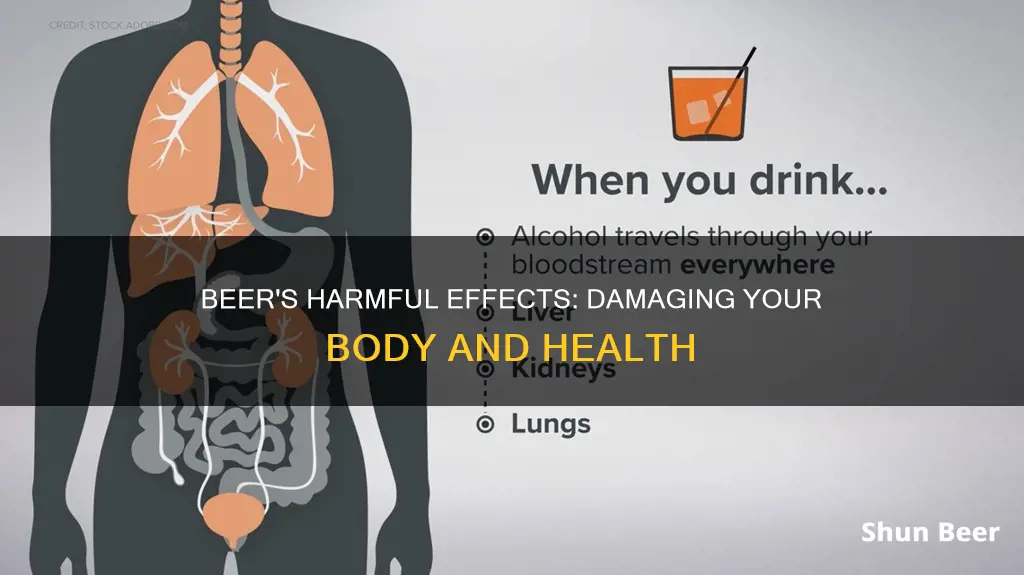
Beer is a popular alcoholic drink made from fermented sugars from starches. While drinking beer is often associated with several health benefits, such as increased bone density, improved gut health, and better lipid levels, excessive drinking can have detrimental effects on the body and brain.
Drinking beer, especially in large quantities, can cause dehydration, disrupt sleep, slow down weight loss, and lead to digestive issues. It can also negatively impact the liver, pancreas, central nervous system, heart, and lungs. Beer consumption can also increase the risk of chronic diseases, including high blood pressure, stroke, heart failure, and certain types of cancer.
While moderate drinking may be considered relatively safe, there is no safe amount of alcohol as even small amounts can negatively affect brain health. Therefore, it is essential to consume beer in moderation and responsibly, following guidelines that recommend limiting daily intake to two drinks or less for men and one drink or less for women.
| Characteristics | Values |
|---|---|
| Brain | Interferes with the brain's communication pathways, affecting the way the brain looks and works. Can change mood and behaviour, and make it harder to think clearly and move with coordination. |
| Heart | Can cause cardiomyopathy, arrhythmias, and high blood pressure. |
| Liver | Can lead to steatosis, or fatty liver. |
| Pancreas | Causes the pancreas to produce toxic substances that can lead to pancreatitis. |
| Cancer | Increases the risk of head and neck cancer, oesophageal cancer, breast cancer, and more. |
| Immune System | Weakens the immune system, making the body more susceptible to diseases like pneumonia and tuberculosis. |
| Sleep | Can disrupt sleep. |
| Weight Loss | Can slow down the weight-loss process. |
| Digestive System | Can cause abdominal pain, bloating and diarrhea. |
| Dehydration | Can lead to dehydration. |
| Chronic Diseases | Increases the risk of high blood pressure, stroke, heart failure, cardiomyopathy, and several types of cancer. |

Liver damage
ARLD typically progresses through three main stages, although there is often an overlap between each stage:
- Alcoholic Fatty Liver Disease: This is the first stage of ARLD and can occur after just a few days of heavy drinking. It is characterised by a build-up of fats in the liver but usually doesn't cause any symptoms. However, it is an important warning sign that an individual is drinking at a harmful level. This stage is reversible if the person stops drinking alcohol for an extended period, typically a few months or years.
- Alcoholic Hepatitis: Alcoholic hepatitis is a potentially serious condition that can develop due to alcohol misuse over a longer period. It can also occur due to binge drinking, although this is less common. Alcoholic hepatitis is often the first indication that a person is damaging their liver through alcohol. This stage is usually reversible if the person stops drinking permanently. However, severe alcoholic hepatitis is a life-threatening condition that can lead to death.
- Cirrhosis: Cirrhosis is a severe stage of ARLD where the liver has become significantly scarred. Even at this stage, there may not be any obvious symptoms. It is generally not reversible, but stopping drinking alcohol immediately can prevent further damage and significantly increase life expectancy.
The treatment for ARLD is to stop drinking alcohol, preferably for the rest of the person's life. This gives the liver the best chance to recover. However, this can be challenging, especially as many people with ARLD have an alcohol dependency problem. Support, advice, and medical treatment may be available through local alcohol addiction support services. In severe cases where the liver has stopped functioning, a liver transplant may be required.
Drinking Beer While Driving: What's the Law in New Zealand?
You may want to see also

Brain function
Alcohol's effects on the brain are varied and wide-ranging, from short-term impacts on coordination and reflexes to long-term damage to the central nervous system.
Short-term effects
Alcohol's short-term effects on the brain can include:
- Slowed reflexes
- Loss of coordination
- Impaired balance, memory and sleep
- Changes in mood and behaviour
- Difficulty thinking clearly
Long-term effects
Long-term, alcohol can cause:
- Persistent changes in mood, including anxiety and irritability
- Insomnia and other sleep issues
- Problems with memory and concentration
- Difficulty focusing on tasks
- Numbness and tingling in the hands and feet
- Damage to the frontal lobe, which is responsible for executive functions like decision-making and social behaviour
- Alcohol-induced psychotic disorder
- Alcohol-induced sleep disorder
- Alcohol-induced depressive disorder
- Alcohol-induced anxiety disorder
Alcohol dependence
Regular drinking can also lead to alcohol dependence, where the body and brain have grown used to alcohol. Quitting drinking can be difficult and may require medical treatment.
Beer and Chemo: What You Need to Know
You may want to see also

Cardiovascular health
Drinking beer, like any other alcoholic drink, can have both positive and negative effects on cardiovascular health.
Positive Effects
Drinking beer in moderation (one to two drinks per day) has been linked to a reduced risk of cardiovascular disease, including coronary heart disease, atherosclerosis, and heart attack, when compared to not drinking at all. It can also reduce the risk of having an ischemic stroke, which is caused by a clot in a blood vessel.
Beer is thought to help prevent heart disease by increasing high-density lipoprotein (HDL), also known as "good cholesterol". The vitamin B6 (pyridoxine) found in beer can also help lower homocysteine levels, a chemical considered a risk factor for heart disease.
Negative Effects
Drinking more than two alcoholic drinks per day can increase the risk of death from heart disease. Drinking large amounts of beer over a long period can cause serious health issues, including dependence, liver problems, and certain types of cancer.
Drinking three or more alcoholic drinks per day can increase blood pressure and worsen high blood pressure. It can also increase the risk of cardiomyopathy, a disorder that affects the heart muscle, and irregular heartbeats (arrhythmias).
Neutral Effects
One 2018 study found that drinking moderate amounts of low-alcoholic beverages, such as beer, did not have as strong a diuretic effect as other alcoholic drinks like wine and liquor.
Other Considerations
Some sources suggest that the positive effects of drinking beer on cardiovascular health may be overestimated and that other factors, such as genetics, lifestyle, and socioeconomic associations, may be at play.
Additionally, while moderate drinking may have some benefits, it is important to note that there is no "safe" amount of alcohol when it comes to brain health. Alcohol use can negatively impact brain function and mental well-being over time.
Did the Cheers Cast Really Drink Beer?
You may want to see also

Immune system
Drinking beer can have a detrimental effect on the immune system, which is designed to protect the body from infections, diseases, and toxins. The immune system is made up of two parts: the innate immune system, which provides general immunity by responding to viruses, bacteria, and other microorganisms that can cause disease; and the adaptive immune system, which looks after immune memory, including remembering previous infections and stopping them from happening again.
Beer drinking can negatively impact both parts of the immune system. Even drinking 5-6 beers in a single session can suppress the immune system for up to 24 hours. Over time, drinking beer can lead to longer-term problems as the immune system takes longer to recognise and respond to infections. This can result in more intense illnesses, longer-lasting symptoms, and a greater struggle for the immune system to fight off infections.
The impact of beer on the immune system can be seen in the lungs and the gut. Beer damages the immune cells that protect the lungs, and impacts the cells within the airways, reducing their ability to remove mucus. This can lead to a weakening of lung function over time, making individuals more vulnerable to serious conditions like pneumonia. Beer also affects the "good" bacteria in the gastrointestinal (GI) tract, which is essential for a healthy immune function. The cells lining the GI tract regulate what is absorbed into the body, and beer impacts these cells, contributing to the development of alcohol liver disease.
Research suggests that heavy and chronic beer drinking can lead to a reduction in T cells and B cells, resulting in fewer antibodies to fight off infections. However, the impact of beer on the immune system can be mitigated by reducing beer consumption. Not drinking beer for 30 days can bring T cell counts back to normal levels.
Pregnant Women and Alcohol: Is Cider Beer Safe?
You may want to see also

Cancer risk
Drinking beer, like any other alcoholic beverage, can increase the risk of several types of cancer. According to the National Cancer Institute, there is a strong scientific consensus that alcohol consumption can cause several types of cancer. Even those who have no more than one drink per day and binge drinkers have a modestly increased risk of some cancers.
Head and Neck Cancer
Moderate to heavy alcohol consumption is associated with higher risks of certain head and neck cancers. Moderate drinkers have 1.8 times higher risks of oral cavity and pharynx cancers and 1.4 times higher risks of larynx cancers than non-drinkers. Heavy drinkers have 5 times higher risks of oral cavity and pharynx cancers and 2.6 times higher risks of larynx cancers. The risks of these cancers are substantially higher among those who also use tobacco.
Esophageal Cancer
Alcohol consumption, regardless of the amount, is associated with an increased risk of esophageal squamous cell carcinoma. The risks range from 1.3 times higher for light drinking to nearly 5 times higher for heavy drinking. People who inherit a deficiency in an enzyme that metabolises alcohol have been found to have substantially increased risks of this type of cancer if they consume alcohol.
Liver Cancer
Heavy alcohol consumption is associated with approximately twice the risk of two types of liver cancer: hepatocellular carcinoma and intrahepatic cholangiocarcinoma.
Breast Cancer
Epidemiological studies have consistently found an increased risk of breast cancer with increasing alcohol intake. Pooled data from 118 individual studies indicates that light drinkers have a slightly increased (1.04 times higher) risk of breast cancer compared with non-drinkers. The risk increases to 1.23 times higher for moderate drinkers and 1.6 times higher for heavy drinkers. An analysis of two US cohort studies concluded that, for women who have never smoked, light to moderate drinking was associated with a 1.13 times higher risk of alcohol-related cancers, mostly breast cancer.
Colorectal Cancer
Moderate to heavy alcohol consumption is associated with 1.2 to 1.5 times higher risks of cancers of the colon and rectum compared with no alcohol consumption.
Other Cancers
Although the evidence is inconsistent, alcohol consumption has been linked to an increased risk of melanoma, prostate cancer, and pancreatic cancer.
Combined Effects of Alcohol and Tobacco
People who use both alcohol and tobacco have much greater risks of developing cancers of the oral cavity, pharynx, larynx, and oesophagus than those who use either alcohol or tobacco alone. The risks associated with using both substances are multiplicative, meaning they are greater than the sum of the individual risks associated with alcohol and tobacco.
Genes and Cancer Risk
An individual's risk of alcohol-related cancers is influenced by their genes, specifically those that encode enzymes involved in metabolising alcohol. For example, the body metabolises alcohol through the activity of an enzyme called alcohol dehydrogenase (ADH), which converts ethanol into the carcinogenic metabolite acetaldehyde. Many individuals of East Asian descent carry a version of the ADH gene that codes for a "superactive" form of the enzyme, increasing their risk of pancreatic cancer.
Pairing Beer and Bourbon: Finding the Perfect Match
You may want to see also
Frequently asked questions
Drinking beer can cause immediate effects such as lowered inhibitions, drowsiness, euphoria, slowed or slurred speech, loss of coordination, and trouble focusing or making decisions.
Drinking beer, especially in large amounts, can have long-term effects on the body, including:
- Increased risk of chronic diseases such as high blood pressure, stroke, heart failure, and cancer.
- Liver disease and cirrhosis.
- Weakened bones and increased risk of fractures.
- Malnutrition and digestive issues.
- Muscle weakness and atrophy.
- A weakened immune system.
Drinking beer can cause long-term effects on the brain, including:
- Numbness and tingling in the hands and feet.
- Difficulty with memory, concentration, and decision-making.
- Changes in emotions, mood, and personality.
- Development of alcohol use disorder.
Drinking beer can have long-term effects on mental health, including:
- Worsening of symptoms of mental health conditions such as anxiety, depression, and bipolar disorder.
- Increased risk of alcohol-induced mental health conditions, including bipolar disorder, psychotic disorder, sleep disorder, depressive disorder, and anxiety disorder.







